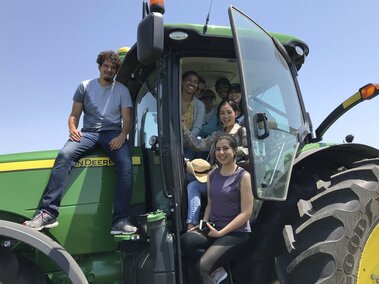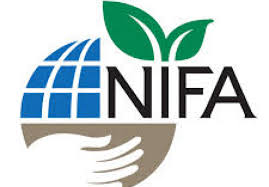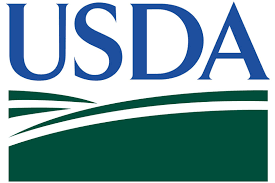REEU: Fostering the Next Generation of Inclusive Agricultural and Natural Resources Professionals through Experiential Learning
Engage in the research and the application of plants and soil to impact food production and the environment.
Description
The goal of this program is to prepare students with both knowledge and skills necessary to address the grand challenges of food production and the environment. Participating students will conduct a summer experiential internship related to their career interests and goals, choosing from a variety of programs in the applied plant, soil, and environmental sciences available through a network of collaborators. The students will also work with their program peers and a team of faculty mentors to engage in activities related to teamwork, decision making, systems thinking, and translating their summer work into learning objects for science literacy.
Stipend is $5000, plus $1000 for translating summer experience into learning objects working with UNL science literacy team.
See the list below for associated mentors and projects.
Want to know more?
Visit: https://agronomy.unl.edu/applied-plant-systems

Benefits
- Competitive stipend: $6,000
- Suite-style room and meal plan
- Travel expenses to and from Lincoln
- Campus parking and/or bus pass
- Full access to the Campus Recreation Center and campus library system
- Wireless internet access
Learn more about academic and financial benefits.
Events
- Department seminars and presentations
- Professional development workshops (e.g., applying to graduate school, taking the GRE)
- Welcome picnic
- Day trip to Omaha's Henry Doorly Zoo and Aquarium
- Outdoor adventures
- Research symposium
Questions about this program?
Please direct any questions related to this program to:
Martha Mamo: 402-472-1555 • mmamo3@unl.edu
Leah Sandall: 402-472-9295 • lsandall5@unl.edu
Who Should Apply

Related Fields of Study
- Plant Breeding
- Plant Production and Management
- Rangeland Ecology
- Soil Management
- Environmental Sciences
- Microbiology
- Agricultural Technology
- Environmental Horticulture
Eligibility
Participation in the Nebraska Summer Research Program is limited to students who meet the following criteria:
- U.S. Citizen or Permanent Resident
- Current undergraduate with at least one semester of coursework remaining before obtaining a bachelor's degree
See Eligibility for more information.
How to apply
Follow the application steps to submit the following materials.
Mentors and Projects
Mentors and Projects
| MENTORS | PROJECTS |
|---|---|
Dr. Guillermo BalboaAGRONOMY AND HORTICULTURE | Digital Agriculture Technologies to Improve Nitrogen Management Students will engage in research activities related to developing novel nitrogen management decision-support systems for Nebraska using digital agriculture technologies. They will also have the chance to participate in experiments with UNL’s Nebraska On-Farm Research Network evaluating different innovative digital agriculture nitrogen management approaches. |
Dr. S. Carolina CórdovaAGRONOMY AND HORTICULTURE | Soil Health Assessment and Carbon Stocks Quantification Students will engage in a project focused on evaluating key indicators of soil health and quantifying carbon stocks to understand their relationships and implications for sustainable agricultural practices. |
Dr. Katherine FrelsAGRONOMY AND HORTICULTURE | Genetic improvement of grain quality traits Students will participate in activities related to disease resistance screening, pest resistance, fall drought tolerance, and phenomic selection for grain quality traits. |
Dr. Amit JhalaAGRONOMY AND HORTICULTURE | Reproductive biology of weeds Evaluate the reproductive biology of weeds and confirm, characterize, and manage herbicide-resistant weeds in agronomic crops in Nebraska. In addition to participating in this research, students will also participate in extension activities. |
Dr. Christian StephensonAGRONOMY AND HORTICULTURE | Integrating ecosystem services with local food production Plants serve important functions including food production, support of pollinators and other wildlife, improvement of water quality, and mitigation of climate change. In this project students will engage with mixed production of food, ornamental, and pollinator plants to assist in determining how these plants achieve these critical ecosystem functions. |
Dr. Daniel UdenAGRONOMY AND HORTICULTURE | Rangeland ecology and management experiments Participate in a collaborative adaptive management project at UNL’s Barta Brothers Ranch in the Nebraska Sandhills. The students will collaboratively design and implement rangeland ecology and management experiments with stakeholders and monitor ecological, economic, and social variables. |
Dr. Sam WortmanAGRONOMY AND HORTICULTURE | Local food production systems and technologies The students will contribute to research and development of novel production systems and technologies that reduce labor and plastic waste and increase water and nitrogen efficiency on urban food production. |
Funding
Funding
Funding for this research program was generously provided by grants from:
- NIFA - National Institute of Food and Agriculture
- USDA - U.S. Department of Agriculture
FUNDING SOURCE:

